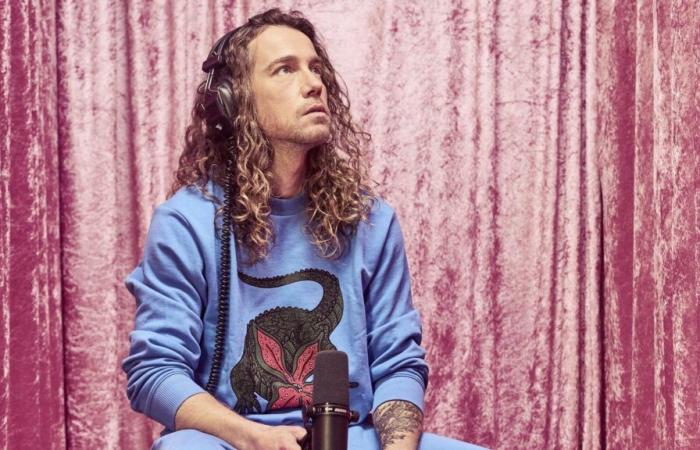Four years later AimeeJulien Doré marks his return with an album of covers, the same ones that propelled him to success during the telecrochet Nouvelle Star. It was 17 years ago. In Impostorwhich is released today, the singer invests in the great classics of French song to put his touch on them, with the maturity that his 42 years give him and the laughing side that characterizes him. The artist with more than 2 million albums sold covers Dalida, Mylène Farmer, Naps, Montagné, Mitchell and Kendji Girac. The author-composer and performer reveals to us the underside of this project which precedes a major tour from March 2025.
Why a return to these covers that made you famous 17 years ago?
It is precisely that, for the memory of this birth, somewhat linked to chance, with the show Nouvelle Star. Without really knowing not only to what extent my life was going to change but also to what extent the songs of others were going to help me present myself at the time and perhaps still today make those who come to me want to see thousands in concert to connect with my journey with my own songs. I needed to look behind me a little, to look at what's crazy for 17 years now, that is, waking up in the morning to do what I love.
You reinterpret “Moi… Lolita” by Alizée, one of your first hits, surrounded only by strings. Why did you reinvest this stock?
Initially, I found it interesting that it wasn't in the album. I was planning to cover songs that I hadn't yet invested in. When I decided to keep Die on stageI told myself that the two most important songs of my time at Nouvelle Star were these titles by Dalida and Alizée, which had kind of started everything. I wanted artistically, the way of revisiting my first “visit” of this title to be a little special. The first challenge in the studio was to remove all instruments leadthe accompaniment of a guitar, a piano. May there be a vapor of melodies, of harmony to accompany my voice. And the second: that I only allow myself the right to record it in one take and that's what I did. As if I had been given a top live. The song closes the album, it is with it that this memory, this nostalgia closes.
When you started, a media outlet had the headline “Genius or imposter?”. Do you suffer from imposture syndrome?
No, I never use the word suffering regarding artists, you have to be careful with words. I have never suffered from having the chance to be listened to, from having the chance to be looked at and even less from having the chance to do what I love. It is possible that I wondered about these words, yes. That word, “impostor”, had an impact on me, I understood years later that this question of my presence at Nouvelle Star was legitimate to be asked. We can question any artistic proposition, it is this mixture of feelings that makes it interesting.
There is a lot of humor in this album project. The cover of “Pourvu qu’elles sont éclairs” is accompanied by a clip with multiple winks…
There are a multiplicity of readings in this clip: the first is to imagine that it is a television performance of a young candidate who is doing a cover. Then, I play with different things: the memory through this haircut which changes and which recalls my beginnings, with television codes like the sign which calls to send a text message on a short number which turns out to be a wink to make a donation to the SPA, then the clownish fall of the piano on which I climb to symbolize failure and leave the possibility of saying that, in a live performance, at any moment everything can collapse…
What made you want to reinterpret this title?
First of all, the attachment to Mylène Farmer and her career. In an era where surexistence is permanent, she is one of the rare French artists who is able to maintain mystery, to cultivate silence, absence. And despite everything, in the snap of her fingers, she filled entire stadiums. And this love between her and the people who love her deeply inspires me a lot. I have a lot of admiration for this woman and what she did artistically. It's a way of paying tribute to him with one of his album opening songs, which I close with Hi… Lolitafor which she wrote the lyrics.
You confessed that all these songs had a hook in a fragment of your life, but it must not have been easy to choose…
We worked on so many songs for 2 years! More than 100 in demo form, we produced around 45 and we decided to finalize a little over twenty before starting to assemble the album. When I started to choose, it was always the ones that I found the most musically accurate and interesting for me. And no doubt, they had something extra that worked, even unconsciously. I realized then that many had an echo in my childhood, in my adolescence… There was a sort of obviousness in these choices, it is certainly something of the intimate order which me guided.
For “Paroles Paroles”, a duet with Sharon Stone, why did you reverse the roles by taking that of Dalida while she plays Alain Delon?
Because it's a song that talks about a relationship of seduction and I found it interesting to find the original roles, that is to say that it's an actor who does this song with a singer, so there , I'm the singer lulled by the phrases of an actress.
How did you choose your duet partners?
Francis Cabrel is the man who made me want to make music. I had the chance to exchange with him, modest and obvious links were created, we both chose to return to our roots to live (he has lived in the Cévennes since 2018, Editor's note) and to go to Paris only when we need it. I had always dreamed of singing with him and it was great as a first duo to record a song that wasn't ours (A happy man by William Sheller). Hélène Ségara, I listened to her a lot as a teenager, with this song There are too many people who love youundoubtedly one of the ones I have listened to the most in my life… As for Sharon Stone, we met 16 years ago at the Cannes Film Festival. I was doing a piano-voice concert, she came closer, listened to me until the end. We took a photo which ended up the next day in Nice-Morning. I told this anecdote in a show, she wrote to me on Instagram to tell me that she had seen it. I remembered this message years later, so I wrote to her in turn to ask her to sing with me and she accepted!






